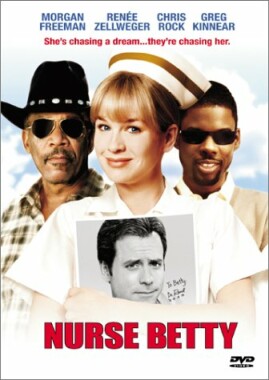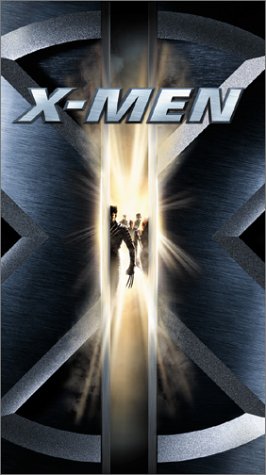Nurse Betty
Nurse Betty, the new film by Neil LaBute (In the Company of
Men, Your Friends and Neighbors), is wonderfully enjoyable all the
way through until its last ten minutes when suddenly the wild and thrilling ride
it has offered us comes to a dead end. The story concerns Betty (Renée
Zellweger), a small-town waitress from Kansas unhappily married to Del (Aaron
Eckhart), a boorish used car salesman who also deals in drugs. To make up for
the lack of romance in her life, Betty obsessively watches television soap
opera, especially a hospital show featuring the dishy Dr David Revel (Greg
Kinnear), on whom she has rather a crush. This interest of hers only increases
the contempt that Del feels for her anyway since, as he tells her, watching the
soaps is for people who have no real life of their own.
LaBute is careful to make us dislike Del from the start. His neglect and
ill-treatment of sweet Betty would be enough to accomplish this end, but he is
also banging his slatternly secretary at work, and, of course, is involved in
drug dealing. But is he not right about soap operas? Well, maybe and maybe not.
Betty’s addiction to them only adds to
her sweetness, after all, and when a horrible fate befalls Del in front of her
eyes—he is murdered by representatives
of some unnamed Mr Big from whom he has stolen
drugs—her retreat into a soap opera
fantasy seems at once to confirm Del’s
dismissive opinion and to rebuke him for it.
He’s a fine one to talk! Having got
himself murdered in front of his wife, it ill-behooves him to find fault with
her for seeking refuge in fantasy from such a
“real
life” as that.
This way through the film encourages us to find a more general idea in
Betty’s temporary derangement, which
takes her to California to find her Dr David, to whom she now imagines herself
engaged. Reading the film in this way, we might take it as a kind of paean to
popular culture as a kind of psychic insulation, the very embodiment of that
“stupidity”
with which George Eliot once said the souls of the best of us had ever to be
“well-wadded.”
It would not be in itself enough to make a good movie. The stupidity is too
stupid for that, and the best parts of
LaBute’s movie make savage fun of the
shallowness and cynicism and self-absorption of those who produce the show when
Betty, Candide-like, ultimately appears among them. But it looks like becoming
the foundation of a splendid movie.
A second thread leading us through the maze is in the relationship between
the two comic hit-men, Charlie (Morgan Freeman) and Wesley (Chris Rock), who
kill Del and then pursue Betty all the way to California. Not only is she an
eyewitness to the murder (although, as they do not yet know, she has blotted it
out of her memory) but she has also inadvertently taken the car in which Del has
secreted the stolen drugs that the two men are charged with recovering. As
Betty’s pilgrimage to meet her true
but fictional love takes us towards some putative epiphany about the power of
cliché, so the hit-men’s
pursuit of her begins by looking like a cliché itself, a familiar
variation on the even more familiar Tarantinian theme of killers doing a comic
double act. At the same time, however, these two provide a running critique of
the sentimental blandness which Betty has wrapped around herself like a
blanket.
Here, we may be inclined to think, is the very image of that real world from
which she seeks to protect herself in all its raucous, deadly hilarity. But not
so fast! If the killers are real they are not without their own illusions, as we
might expect from a cliché. In particular, the older of the two, Charlie,
is made—with less of a sense of
paradox about it than there would have been ten years
ago—the representative of traditional
American attitudes, of hard work and pride in craftsmanship. What he objects to
in his hot-headed, pleasure-loving, show-boating younger colleague is
“that make-a-statement, end-zone dance
attitude” which he sees as
“taking the country
down.” Charlie is a traditionalist, a
“professional”
who lives by the rules of his trade and is looking forward to a well-earned
retirement spent on his new boat. The only way for him to escape from such a
multiplication of clichés
is—what? For him to fall in love with
Betty!
It is a brilliant if inherently unstable idea. Betty thus becomes for Charlie
what the elusive Dr Revel is for Betty: the romantic ideal that each has
conjured out of available ingredients as a proof against despair. There is a
terrific scene near the end of the film in which Charlie presents himself and
the moral squalor of his life to Betty as a precious object at the very moment
when she thinks that he is about to rape and kill her. He calls himself
“a garbage man of the human
condition” whose existence is bound up
with “people who would trade anything
for a few more minutes of their rotten
lives.” She,
“beautiful and
talented” as she is, is nothing like
them and obviously the representative of his only hope of a world that is
nothing like them. For Charlie, Betty redeems humanity itself.
Still terrified, she tells him,
“I’m
not who you think I am,” which is
richly comic coming from one who, through most of the movie, is not who
she thinks she is either.
Charlie increases the wonderful absurdity of the occasion by pleading his
case with her. “I like walks in the
rain and sunsets,” he says.
“I read passionately…I’m
conservative but flexible.” Most
importantly, he concludes, “You and I
have more in common than you might
think.”
“I thought you were the garbage man
of the human condition,” she says. Ah,
yes. Reality at last!
But LaBute has one more trick to play on us. Charlie, to be sure, is in a
manner of speaking rescued from his illusion with the help of a thrilling plot
twist that I will not reveal here. But before he goes he leaves Betty with yet
another illusion, another cliché, to replace that of the disappointing Dr
Revel. “You never needed that
doctor,” he tells her.
“You don’t need any man. It’s not the
’40s, you know. You don’t need
anybody. You know why? Because you’ve got
yourself.” The banality, the patness
of it is breathtaking. Surely this appeal to a shopworn feminist
“self-esteem”
mantra is but another twist of the road, a political cliché wheeled on to
take the place of the now-exploded romantic ones?
But the film ends with LaBute’s
embracing this cliché himself, and we cannot but think that such an act
casts a retrospective doubt backwards over the subtlety and intelligence of all
that has come before. Does he really believe in such simple political and
psychological bridges over the yawning abysses of
“the human
condition” ? Or is this ending just a
kind of postmodern shrug of the shoulders, an admission that he has left us with
an entropic soup of a movie in which everyone is simply entitled to his own
fantasy? Either way, it is a great disappointment at the end of what is
otherwise a terrifically entertaining film.
Discover more from James Bowman
Subscribe to get the latest posts to your email.








